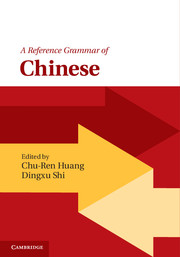Book contents
- Frontmatter
- Dedication
- Contents
- List of figures
- List of tables
- List of contributors
- Preface
- Acknowledgements
- English–Chinese term list
- Chinese–English term list
- 1 Preliminaries
- 2 Syntactic overview
- 3 Lexical word formation
- 4 Verbs and verb phrases
- 5 Aspectual system
- 6 Negation
- 7 Classifiers
- 8 Nouns and nominal phrases
- 9 Relative constructions
- 10 Adjectives and adjective phrases
- 11 Comparison
- 12 Adverbs
- 13 Prepositions and preposition phrases
- 14 Sentence types
- 15 Major non-canonical clause types: ba and bei
- 16 Deixis and anaphora
- 17 Information structure
- Appendix: Punctuation
- Bibliography
- Index
3 - Lexical word formation
Published online by Cambridge University Press: 05 March 2016
- Frontmatter
- Dedication
- Contents
- List of figures
- List of tables
- List of contributors
- Preface
- Acknowledgements
- English–Chinese term list
- Chinese–English term list
- 1 Preliminaries
- 2 Syntactic overview
- 3 Lexical word formation
- 4 Verbs and verb phrases
- 5 Aspectual system
- 6 Negation
- 7 Classifiers
- 8 Nouns and nominal phrases
- 9 Relative constructions
- 10 Adjectives and adjective phrases
- 11 Comparison
- 12 Adverbs
- 13 Prepositions and preposition phrases
- 14 Sentence types
- 15 Major non-canonical clause types: ba and bei
- 16 Deixis and anaphora
- 17 Information structure
- Appendix: Punctuation
- Bibliography
- Index
Summary
Introduction
Lexical word formation is the formation of words using rules of morphology rather than other types of linguistic rules such as rules of syntax. Following this definition, lexical word formation does not apply to words formed by inflectional affixation, i.e., words containing grammatical suffixes such as -le0 了, -guo4 过, -zhe0 着, and 得/不 de0/bu4. The reason inflectional affixation is not considered a lexical word formation process is that a new lexeme is not created by the addition of these affixes. Lexical word formation either causes a new lexeme to be created (see further discussion in section 3.3.1.) or derives a word using derivational affixation, with the derived word often having a different part of speech (e.g., the verb gong1ye4hua4 工业化 work-profession-AFF ‘industrialize’ is derived from the noun gong1ye4 工业 work-profession ‘industry’ by affixation of the derivational suffix 化 -hua4 ‘-ize/-ify’).
Defining “word” in Chinese
In order to discuss lexical word formation, we must first define what a word is in Chinese.
“Word” in the Chinese language can be defined using the construct minimal free form – the smallest linguistic entity that can independently occupy a part-of-speech slot. Take, for example, the morpheme/character 椅 yi3 ‘chair.’ 椅 yi3 is a bound morpheme as it cannot be used alone as a word. 椅 yi3 either must be affixed with the nominal suffix -子 zi0 to derive the free noun 椅子 yi3zi0 ‘chair,’ or it must be used in combination with another morpheme, such as 轮 lun2 ‘wheel,’ to yield the two-morpheme word 轮椅 lun2yi3 ‘wheelchair.’ To take another example, the morpheme 机 ji1 ‘machine’ cannot be used as a word by itself, but must occur with another morpheme (e.g., 机器 ji1qi4 machine-utensil ‘machine’) to stand alone as a word.
It is important to note that the crucial property of a free form is its ability to stand alone in some context. A free form's ability to stand alone does not preclude its ability to combine with other elements to form a new word. Hence, words can combine, via composition and compounding (see discussion in sections 3.4.1. and 3.4.2 respectively), to form longer words. In addition, though there is no theoretical upper limit on the length of a word, in practical terms words do have a de facto length limit.
- Type
- Chapter
- Information
- A Reference Grammar of Chinese , pp. 67 - 80Publisher: Cambridge University PressPrint publication year: 2016
- 2
- Cited by



